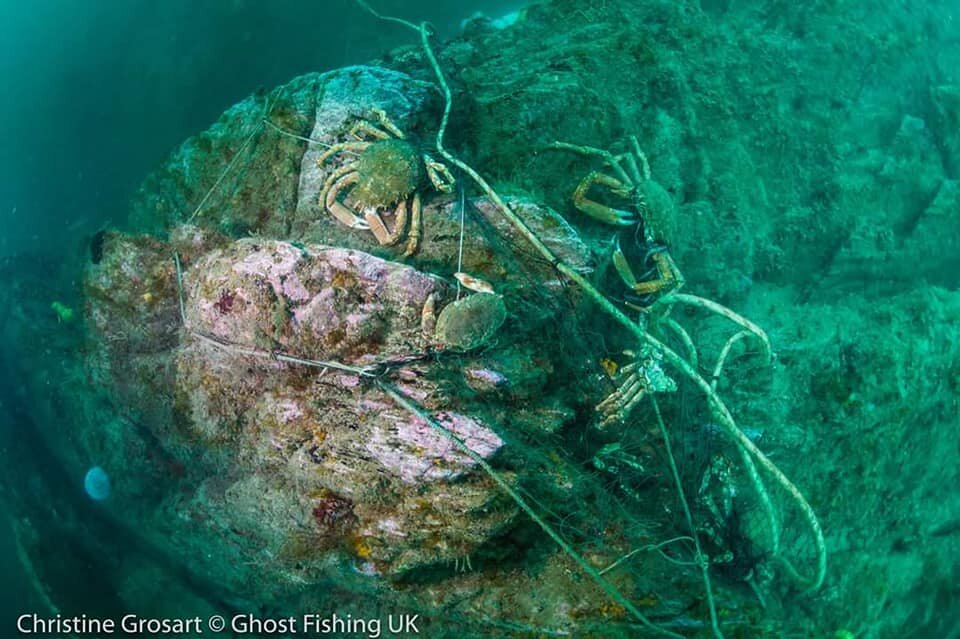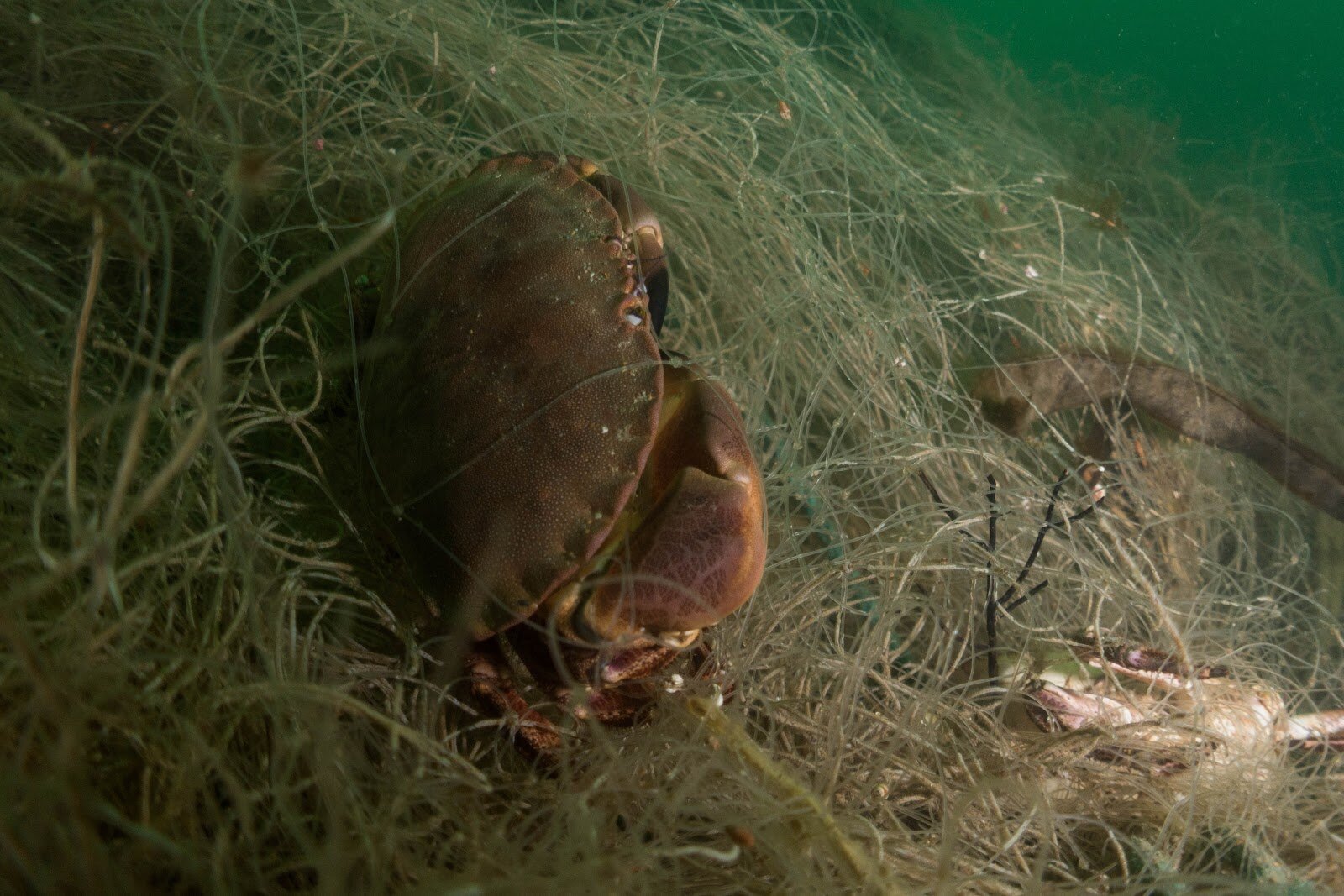Into The Industry: Ghost Fishing UK
An Interview with John Wheeler
Just below the sea’s surface lurks a dangerous graveyard full of ghosts seeking to ensnare wildlife and divers alike. Ghost Fishing gear is fishing gear that has been lost to the sea and forgotten. Much of it is plastic that continues to capture sea creatures creating dangerous, diving environments as it sits on the ocean floor slowly breaking down into microplastics over time. Shawn sat down with John Wheeler from Ghost Fishing UK to discuss the amazing work they do in protecting the ocean, animals, and divers from lost fishing gear.
Hi John! Tell us a bit about yourself and Ghost Fishing UK.
I’m a Marine biologist and freelance professional diver currently based in Plymouth. In my free time, I’m a technical diver, photographer, and the South West representative and instructor for Ghost Fishing UK.
Ghost Fishing UK is a charity organisation created with the aim of removing lost fishing gear from the marine environment. Great care and teamwork are needed to overcome this challenge and we specifically train divers to work within our teams across the UK to recover lost equipment. Without knowing where the lost gear is we wouldn’t be able to do the work we do our designated online reporting system enables recreational divers to accurately report what they find. With the data collected by recreational divers, alongside data from gear recoveries, we can create a database to see what impact we are having on lost fishing gear and benefits to the marine environment.
You’ve built your life around the ocean. What drew you to it in the first place?
I grew up a 5-minute walk from the sea in the seaside town of Hastings. Before I could walk my mum was taking me to the aquarium, I had a season ticket and used to go every Friday so I think I can blame her for it all! I spent my childhoods days down the beach rock pooling, fishing, sailing and snorkelling. When I was 13, my maths teacher organised for a group of us from school to do our PADI open water certification with a local dive club, I still remember every moment of the course, even now with 10 years of diving behind me.
As for getting into Ghost Fishing, Richard Walker was giving a talk at my University when I was in my final year, I had already seen what the organisation did through their Facebook page and asked Rich after the talk how could I get involved. After helping out on a couple of recoveries and passing my training course I became a ghost fishing diver!
Tell us about the Ghost Fishing team.
Ghost fishing UK is an entirely volunteer-run so without the countless hours the team put in every year we wouldn’t be able to do the good work that we do. The backgrounds of our volunteers are incredibly diverse, from paramedics to financial advisors to professors! But we’re all linked by our love of diving and a desire to make a positive impact on the marine environment. We currently have a core team of divers who end up travelling far and wide to carry out ghost gear removals, as our team grows it’ll enable us to have regional teams able to get in the water as quick as possible to remove lost gear.
What does a day of work look like at Ghost Fishing UK?
No day is the same! The complexity of the task and level of diving required to achieve it mean we’re always having to think one step ahead. But the average day for us will be a team meet up at the boat or diving location, often early in the morning to catch slack tide with plenty of coffee in hand. Once the equipment is built and checked, the lead diver for the day will brief the team and delegate smaller teams to tackle individual tasks. Our standard procedures are to spend one dive or day surveying the lost gear and then a second dive or day removing it, this way we can have a chat between dives about the best way to remove the item as there’s little scope for detailed discussion underwater. The work doesn’t stop once the lost gear is out the water, any marine life stuck in it is surveyed for our data studies and released back into the wild. Then comes the task of disposing of the materials, sure we could throw it into landfill but this is far from a perfect solution. Wherever possible, the materials are sent off to be recycled.
Divers removing a lost fishing net. Photo: Ghost Fishing UK
What impact do you hope to have on the ocean?
Our aim is to reduce the amount of lost fishing gear in the seas around the UK, by doing this we not only reduce the death of wildlife but also reduce micro plastics being released into the oceans as the fishing gear degrades.
The diving community have been extremely supportive of our work and without them, we wouldn’t be able to do what we do! Donations to our cause and reports of lost fishing gear from the diving members of the general public enable us to do what we do.
Our long-standing project is the Scapa Flow project and was the annual flagship event for Ghost Fishing UK with a team of divers and instructors heading to Scapa Flow once a year to remove lost fishing gear and train new Ghost Fishing divers. In 2018, we culminated this project by training new Ghost Fishing instructors and removing the last bits of remaining fishing gear. This enables us to officially declare Scapa Flow clear of lost fishing gear just in time for the Scapa 100 year anniversary in 2019!
Crab entangled in fishing net. Photo: Ghost Fishing UK
Are there any recommendations you’d like to make to divers that encounter ghost fishing gear?
Avoid it as much as possible! But if it’s safe to do so, carry out a little survey of where it is and what type it is (pots, net etc), photos are brilliant help but sketches on slates and in wet notes are more than enough, send that report in via our website for us to take care of!
Link for reporting-https://docs.google.com/forms/d/e/1FAIpQLSeR9iap0wMz9Q2gIWcfQjHajsna-0WTPFjupXwmwYQA-wKLVQ/viewform
Whose work has influenced and inspired you?
Watching what other ghost fishing teams around the world achieve is a big motivator for our team to do the same. The Dutch team are essentially our origin after Richard Walker worked with them and set about to father the UK team.
Ghost Fishing diver frees crabs entangled in lost fishing gear. Photo: Ghost Fishing UK
If someone wants to become a volunteer, what pre-requisites should they have beforehand and how should they contact the organisation?
Our prerequisites are achievable for most UK divers, you’ll need to be comfortable diving in a twinset, have good teamwork skills, and be prepared to give up your free time to make a difference. You can contact us via our Facebook page or via email on- uk@ghostfishing.org






